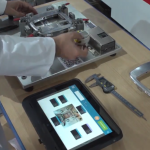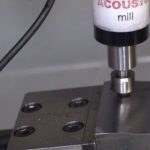
A solution to detect behaviour patterns for quality systems applied to industry
February 20, 2024
BRUVIT: A new ultrasonic-assisted ball burnishing tool to improve the finish in turning operations
March 19, 202420/02/2024
The research and innovation laboratory at the Barcelona School of Informatics (inLab FIB) of the Universitat Politècnica de Catalunya - BarcelonaTech (UPC) is taking part, along with the distribution company Assolim, in the design of a test of concept to create optimised routes for each vehicle for transport on demand.
Assolim is a global distribution company in the food sector in Catalonia. It is a leader in fresh, frozen and room temperature products that offers the best solutions for the catering sector.
It has the capacity to store the over 4,500 different products that are in high rotation in its current portfolio, due to the 9,500 pallet locations that it has for frozen, chilled and room temperature products. In this way, it conserves its products in excellent facilities under optimum conditions, to maintain the overall quality and ensure that all the requirements are met to follow monitor traceability and rotation.
The transport fleet has 60 vehicles that are ready to distribute fresh, frozen and room temperature products daily. It covers all of Catalonia and nearby locations.
The size of the fleet and the high volume of deliveries carried out every day means that the planning, which is currently done by hand, is difficult and gives rise to routes that are not very efficient. There is little capacity to react to unexpected events and last-minute changes.
For this reason, a test of concept has been developed that enables a set of optimised routes to be created for transport on demand. It meets the delivery time restrictions of each customer, and the working hours of the vehicles, considering the specific characteristics of each vehicle.
The result of this test of concept is a route plan for each vehicle. Each one of these routes has a list of times and locations of the establishments where each order must be delivered.
Technology
Topic
You want to know more?
Related Projects
- A research team from the UPC, in collaboration with the company B. Braun Surgical, has created a ceramic and biocompatible catalyst that captures greenhouse gases and transforms them into useful chemical products in a more sustainable way and at a lower cost than current technologies. The technology has successfully passed the pilot phase through joint projects with companies from different sectors.
- The Visualisation, Virtual Reality and Graphic Interaction Research Group (ViRVIG) at the Universitat Politècnica de Catalunya - BarcelonaTech (UPC) participates in the CLIPE project under the MSCA-ITN call, which has developed technologies to provide virtual characters in immersive VR/AR environments with natural behaviour and interaction between virtual characters, making them more human and realistic, with potential applications in industry, video games, training and simulation.
- As part of the DigiPatICS project, eight ICS hospitals have optimised breast cancer diagnosis thanks to artificial intelligence (AI) algorithms that automate the analysis of tissue samples, enabling earlier and more accurate detection of the disease. The results and diagnoses are shared in real time across the eight centres, thereby forming the largest pathology network in Europe.
- The research groups in Biomaterials, Biomechanics and Tissue Engineering (BBT) and the Barcelona Research Center in Multiscale Science and Engineering (CCEM) at the Universitat Politècnica de Catalunya – BarcelonaTech (UPC) have developed biodegradable shape-memory stents for pediatric patients with aortic coarctation.





